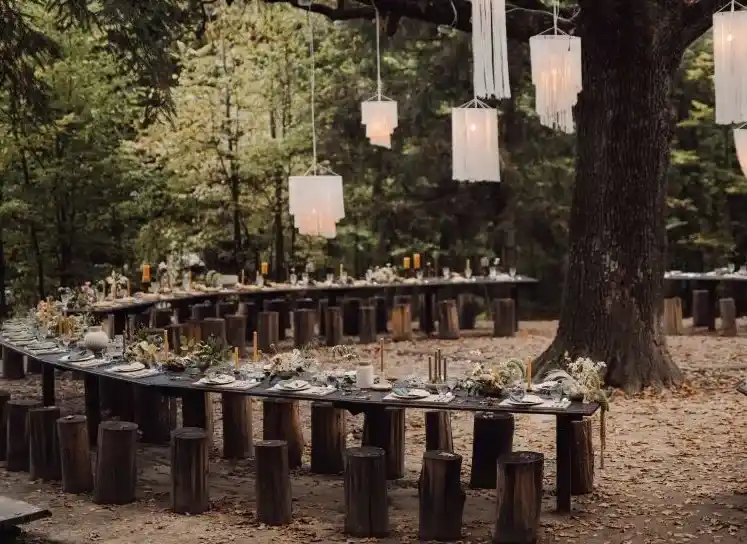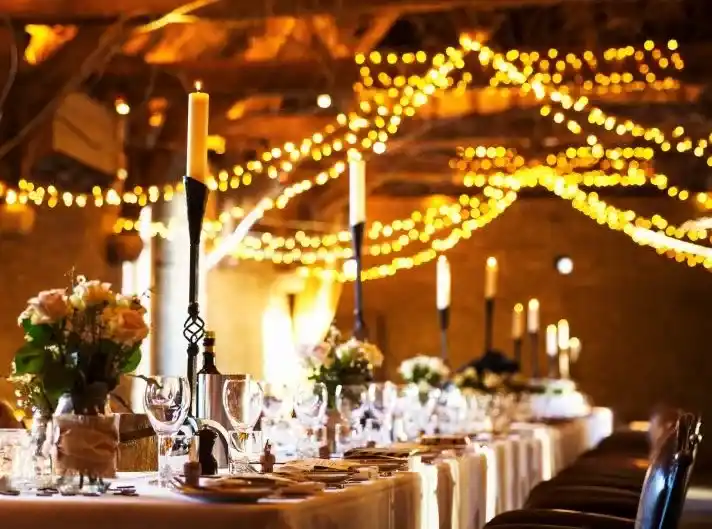
Planning an engagement party
August 19, 2023Tent Rentals in Calgary for Unforgettable Outdoor Events
August 31, 2023Mastering the Art of Wedding Planning: A Comprehensive Guide
Planning a wedding is an intricate journey that combines love, creativity, and organization. While many couples choose to enlist professional help, there’s an array of reasons why some opt to take on the bulk of wedding planning themselves. From budget constraints to the allure of DIY possibilities, planning your dream wedding can be a rewarding endeavor with the right approach.
Organization is, above all, the cornerstone of successful wedding planning. Firstly, the first step is to allocate ample time for the process, aiming for a year if possible. Additionally, this collaborative process should involve both partners, ensuring that the wedding reflects the essence of your relationship. Moreover, amidst the myriad of decisions, it’s important to prioritize the joy of celebrating your love, surrounded by family and friends.
Embarking on this journey might seem overwhelming, but it can also be an exciting adventure. Embrace the process and remember that it’s your special day. As you delve into the realm of wedding planning, here are some essential steps and tips to create the wedding of your dreams:
1. Crafting Your Budget and Sticking to It
Firstly, your wedding budget will be the compass guiding your decisions. Whether family members contribute or you’re footing the bill, scrutinize your finances to avoid surprises. Align your expectations with your financial reality and commit to staying within budget.
2. Identifying Wedding Priorities
Secunly, sitting down with your partner to define your three most significant wedding priorities will guide your decision-making process. Prioritize these elements while remaining flexible with others, enabling you to create a memorable experience within your budget.
3. Defining Your Wedding Style
Gather inspiration from platforms like Pinterest, Instagram, and bridal sites to clarify your wedding style. Develop a visual representation of your desired look and feel to guide your decisions and maintain a cohesive theme.
4. Efficient Organization
Utilize tools like checklists, spreadsheets, or wedding planning apps to streamline your tasks. Platforms such as WeddingHappy and AllSeated can help you stay organized and visualize your plans effectively.
5. Involving Your Partner
Partner participation is crucial; above all, their insights and opinions enrich the process. Additionally, making decisions together not only strengthens your relationship but also fosters teamwork.
6. Seeking Professional Guidance
Consider utilizing wedding planning books and resources, like etiquette guides and timelines, to navigate the process effectively.
7. Venue Selection and Date Flexibility
Choose potential wedding dates and venues, remaining open to flexibility to secure your preferred options. Seasonal and date availability, as well as guest convenience, should influence your decisions.
8. Personalizing Your Theme
Select a theme or aesthetic that resonates with you both. This overarching concept will guide your design choices and ensure a cohesive atmosphere.
9. Building a Thoughtful Guest List
Engage family members and key individuals in creating a guest list, as well as prioritize who you want to share this special day with, in light of your venue and budget constraints.
10. Researching and Booking Vendors
When selecting vendors, conduct thorough research and consider multiple options to find professionals who align with your vision and budget.
11. Careful Contract Review
Review vendor contracts meticulously, not only ensuring all details are included and accurately represented, but also paying attention to cancellation policies, scope of service, and potential revisions.
12. Choosing Your Wedding Party Wisely
Select your wedding party based on emotional and tactical support. Choose individuals who are committed to their roles and responsibilities throughout the planning process.
13. Accommodating Guests
Arrange hotel room blocks to simplify lodging for out-of-town guests. Some hotels offer incentives, adding value to your guests’ experience.
14. Shopping for Wedding Attire
Begin shopping for wedding attire well in advance. Reserve time for fittings and alterations to ensure a perfect fit.
15. Crafting a Wedding Website
Create a comprehensive wedding website with essential details for guests. Firstly, include information about dates, times, and locations. Additionally, provide dress codes, registries, transportation options, and health and safety guidelines.
16. Curating a Meaningful Registry
Build a thoughtful registry that aligns with your preferences and goals. Include registry details on your wedding website or invitation insert.
17. Enlisting Support
Delegate tasks to your wedding party, family, and friends, as each person’s strengths can contribute to a smooth planning process.
18. Strategic DIY Approach
Incorporate DIY elements for personal touches, but avoid overwhelming yourself. Delegate tasks to professionals when necessary, such as florals and food.
19. Taking Breaks as a Couple
Set aside time to relax and enjoy each other’s company amidst the planning chaos. Taking a break can alleviate stress and keep your relationship strong.
20. Designing Invitations and Save-the-Dates
Plan wedding stationery once you’ve determined your wedding style and secured your venue. Send save-the-date cards nine months before a destination wedding or four to six months prior for local celebrations.
21. Securing an Officiant
Choose an officiant who resonates with your values and preferences. Research thoroughly and discuss personalized elements, such as vows and ceremony style.
22. Adding Personal Touches
Incorporate personal, cultural, or familial touches to make your wedding uniquely yours.
23. Organizing Transportation
Arrange transportation for yourselves. Above all, prioritize the wedding party and guests, ensuring a smooth flow of events. Additionally, consider the location and theme for creative transportation choices.
24. Selecting Wedding Bands
Shop for wedding bands to complement your engagement ring and symbolize your union.
25. Planning Pre-Wedding Events
Coordinate pre-wedding events like engagement celebrations, showers, and bachelor/bachelorette parties. Collaborate with hosts and contribute to planning where necessary.
26. Embracing Your Preferences
Craft a wedding that reflects your values and preferences, even if it means deviating from traditional norms.
27. Detailing the Rehearsal Dinner
Plan the rehearsal dinner, considering venue, guest list, catering, and invitations. Integrate it into the wedding weekend or host it separately.
28. Considering a Day-Of Coordinator
Even without a full-service planner, a day-of coordinator can ensure smooth execution of your plans. Book this professional well in advance.
29. Developing a Social Media Strategy
Determine your approach to social media sharing, whether encouraging or discouraging guest posting. Implement hashtags, signage, and photo booths for interactive engagement.
30. Meeting Legal Requirements
Research and prepare necessary documents for obtaining a marriage license. Stay mindful of timelines, especially for destination weddings.
31. Delaying Honeymoon Planning
Postpone detailed honeymoon planning to avoid overwhelming yourself. Spacing out wedding and honeymoon allows you to savor both experiences.
32. Allocating Toasts and Readings
Arrange toasts and readings to honor important individuals in your life. First and foremost, define the speaking order and then choose content that holds significance.
33. Finalizing Setup Details
Consult your venue for setup timelines and communicate with vendors to ensure a coordinated event.
34. Crafting a Memorable Playlist
Compile a playlist with must-play and do-not-play songs to curate the perfect musical atmosphere.
35. Writing Meaningful Vows
Devote time to write heartfelt vows that encompass your promises to each other, emphasizing the significance of this union.
36. Creating a Day-Of Schedule
Develop a detailed schedule of events to keep everyone informed and ensure a seamless wedding day.
37. Expressing Gratitude
Show appreciation to those who contributed to your wedding journey. Plan thoughtful gestures for the wedding party, family, and friends.
38. Embracing the Moment
Amidst the chaos, focus on the bigger picture and enjoy every moment. Be present, relish the love, and cherish this once-in-a-lifetime experience.
39. Prioritizing Quality Photography
nvest in professional photography to capture the essence of your day. Above all, a skilled photographer will immortalize the emotions, moments, and details that make your wedding truly special. Additionally, their expertise ensures that every cherished moment is preserved for generations to come.
40. Capturing Beautiful Memories
Hire a talented videographer to document your wedding day in motion. A wedding video allows you to relive the emotions and details that unfold in real time.
41. Navigating Cultural Traditions
If you come from diverse cultural backgrounds, embrace and integrate your traditions into the celebration. This not only honors your heritage but also adds depth and meaning to your wedding.
42. Embracing Imperfection
Finally, remember that perfection is subjective and that unexpected situations might arise. Adaptability and a positive attitude will help you navigate any challenges that come your way.
Planning a wedding is a dynamic journey that demands creativity, organization, and passion. To begin with, each step weaves into the tapestry of your love story. Moreover, by taking into account these 42 expert tips for wedding planning, you’re fully prepared to embark on this adventure with confidence. Notably, your wedding day symbolizes a celebration of love, commitment, and the inception of a new chapter. As you navigate this path, remember to prioritize what genuinely matters: the love you share, the moments you create, and the joy that envelops you.
Do not hesitate to contact us.








